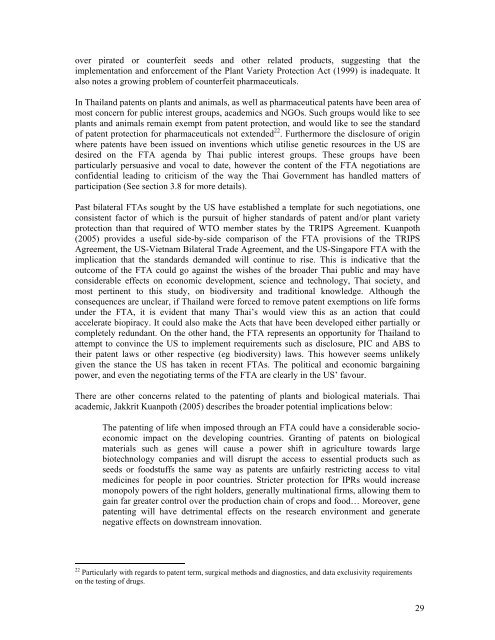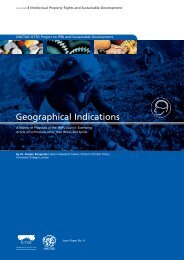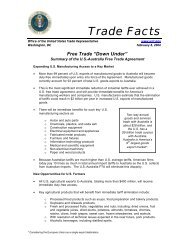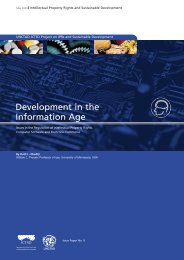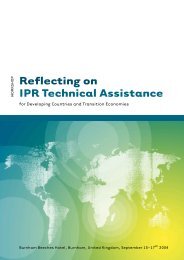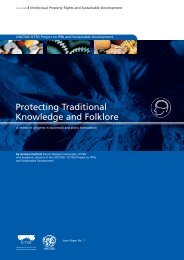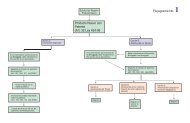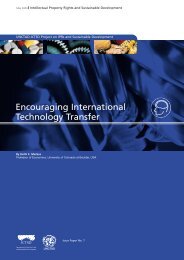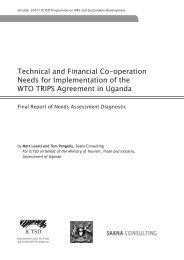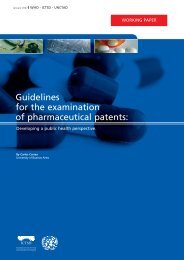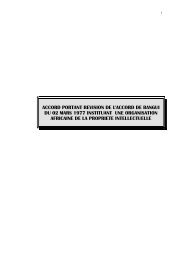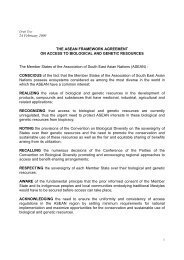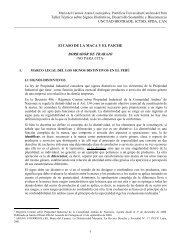Governance and Micropolitics of Traditional ... - IPRsonline.org
Governance and Micropolitics of Traditional ... - IPRsonline.org
Governance and Micropolitics of Traditional ... - IPRsonline.org
You also want an ePaper? Increase the reach of your titles
YUMPU automatically turns print PDFs into web optimized ePapers that Google loves.
over pirated or counterfeit seeds <strong>and</strong> other related products, suggesting that the<br />
implementation <strong>and</strong> enforcement <strong>of</strong> the Plant Variety Protection Act (1999) is inadequate. It<br />
also notes a growing problem <strong>of</strong> counterfeit pharmaceuticals.<br />
In Thail<strong>and</strong> patents on plants <strong>and</strong> animals, as well as pharmaceutical patents have been area <strong>of</strong><br />
most concern for public interest groups, academics <strong>and</strong> NGOs. Such groups would like to see<br />
plants <strong>and</strong> animals remain exempt from patent protection, <strong>and</strong> would like to see the st<strong>and</strong>ard<br />
<strong>of</strong> patent protection for pharmaceuticals not extended 22 . Furthermore the disclosure <strong>of</strong> origin<br />
where patents have been issued on inventions which utilise genetic resources in the US are<br />
desired on the FTA agenda by Thai public interest groups. These groups have been<br />
particularly persuasive <strong>and</strong> vocal to date, however the content <strong>of</strong> the FTA negotiations are<br />
confidential leading to criticism <strong>of</strong> the way the Thai Government has h<strong>and</strong>led matters <strong>of</strong><br />
participation (See section 3.8 for more details).<br />
Past bilateral FTAs sought by the US have established a template for such negotiations, one<br />
consistent factor <strong>of</strong> which is the pursuit <strong>of</strong> higher st<strong>and</strong>ards <strong>of</strong> patent <strong>and</strong>/or plant variety<br />
protection than that required <strong>of</strong> WTO member states by the TRIPS Agreement. Kuanpoth<br />
(2005) provides a useful side-by-side comparison <strong>of</strong> the FTA provisions <strong>of</strong> the TRIPS<br />
Agreement, the US-Vietnam Bilateral Trade Agreement, <strong>and</strong> the US-Singapore FTA with the<br />
implication that the st<strong>and</strong>ards dem<strong>and</strong>ed will continue to rise. This is indicative that the<br />
outcome <strong>of</strong> the FTA could go against the wishes <strong>of</strong> the broader Thai public <strong>and</strong> may have<br />
considerable effects on economic development, science <strong>and</strong> technology, Thai society, <strong>and</strong><br />
most pertinent to this study, on biodiversity <strong>and</strong> traditional knowledge. Although the<br />
consequences are unclear, if Thail<strong>and</strong> were forced to remove patent exemptions on life forms<br />
under the FTA, it is evident that many Thai’s would view this as an action that could<br />
accelerate biopiracy. It could also make the Acts that have been developed either partially or<br />
completely redundant. On the other h<strong>and</strong>, the FTA represents an opportunity for Thail<strong>and</strong> to<br />
attempt to convince the US to implement requirements such as disclosure, PIC <strong>and</strong> ABS to<br />
their patent laws or other respective (eg biodiversity) laws. This however seems unlikely<br />
given the stance the US has taken in recent FTAs. The political <strong>and</strong> economic bargaining<br />
power, <strong>and</strong> even the negotiating terms <strong>of</strong> the FTA are clearly in the US’ favour.<br />
There are other concerns related to the patenting <strong>of</strong> plants <strong>and</strong> biological materials. Thai<br />
academic, Jakkrit Kuanpoth (2005) describes the broader potential implications below:<br />
The patenting <strong>of</strong> life when imposed through an FTA could have a considerable socioeconomic<br />
impact on the developing countries. Granting <strong>of</strong> patents on biological<br />
materials such as genes will cause a power shift in agriculture towards large<br />
biotechnology companies <strong>and</strong> will disrupt the access to essential products such as<br />
seeds or foodstuffs the same way as patents are unfairly restricting access to vital<br />
medicines for people in poor countries. Stricter protection for IPRs would increase<br />
monopoly powers <strong>of</strong> the right holders, generally multinational firms, allowing them to<br />
gain far greater control over the production chain <strong>of</strong> crops <strong>and</strong> food… Moreover, gene<br />
patenting will have detrimental effects on the research environment <strong>and</strong> generate<br />
negative effects on downstream innovation.<br />
22 Particularly with regards to patent term, surgical methods <strong>and</strong> diagnostics, <strong>and</strong> data exclusivity requirements<br />
on the testing <strong>of</strong> drugs.<br />
29


